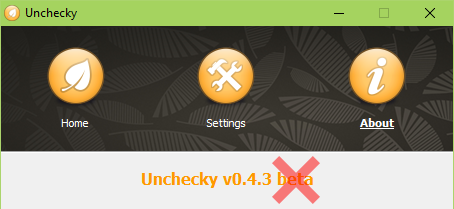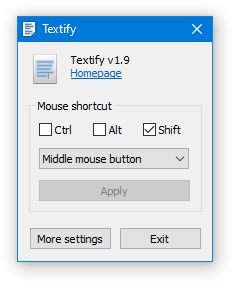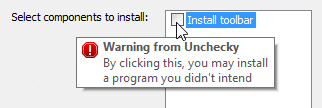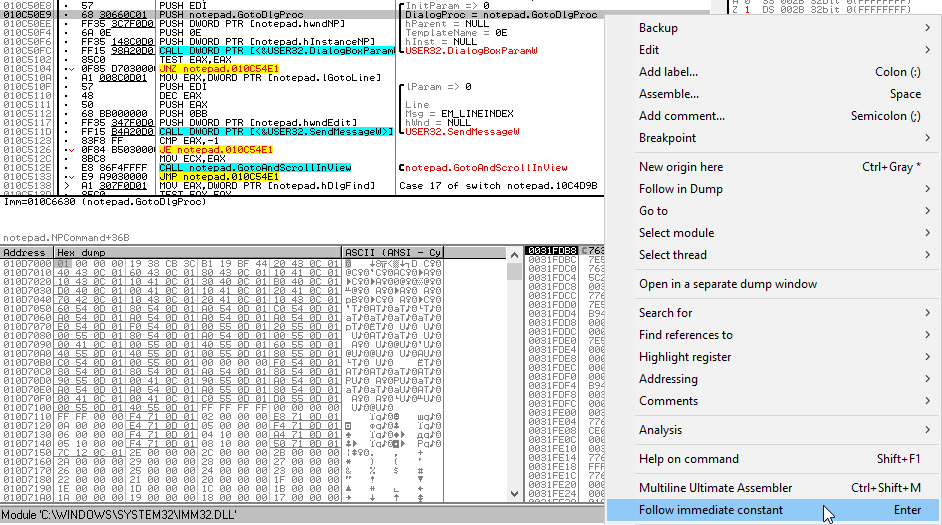As some of you might have noticed, 7+ Taskbar Tweaker v5.2 was released about a week ago. The main feature of the new tweaker version is the support for the new Windows 10 update, known as the Anniversary Update, which was released on August 2. Apart from the support for the new update, v5.2 brought some new features. Below are some of them.
Windows 10 virtual desktops and the order of taskbar items
Have you ever experienced the following taskbar ordering issue in Windows 10?
I encounter it once in a while, and I wanted to have a fix for it for a long time now. Finally, the virtual_desktop_order_fix advanced option of 7+ Taskbar Tweaker v5.2 fixes this issue and preservers the order of the taskbar items when switching between virtual desktops.
Read More…
Posted in
Software,
Updates on September 15th, 2016.
75 Comments.
We’re glad to announce that Unchecky v1.0, the first non-beta version of Unchecky, was released today!
No longer beta

The very first version of Unchecky was released in 2013, almost three years ago, as an experimental tool to help people avoid potentially unwanted programs.
Since then, a lot of work has been done. Many known issues were fixed. Many popular, and less popular programs became supported with time. Several cool features were added.
As of today, Unchecky has more than one million active users, which are much less likely to install software which they didn’t intend to install thanks to Unchecky. Based on the users’ experience and the feedback that we get, Unchecky is mature enough for everyday use. Therefore, we decided to finally remove the beta label from Unchecky. That means that if you were hesitant to try Unchecky because of its experimental status, it’s time to re-think it and give Unchecky a try.
Read More…
Posted in
Software,
Updates on August 21st, 2016.
9 Comments.
Microsoft has announced that the second update of Windows 10, the Anniversary Update, is going to be available on August 2. While the update is not available yet, there are rumors that the update will be based on Windows 10 build 14393, which is available for the participants of the Windows Insider program.
Meanwhile, I have updated 7+ Taskbar Tweaker to be compatible with Windows 10 build 14390. There’s an alpha version available, which is functional, but not complete: some of the options still don’t work properly with the new build. Also, the alpha version might work for Windows 10 build 14393, but it wasn’t tested. Those of you who have donated can get the alpha version here (the link was removed).
Alpha version changelog
- v5.1.9.2 (August 6): Implemented the
Display seconds on the tray clock option, fixed the Hide the Start button option for 64-bit.
- v5.1.9.3 (August 13): Fixed the
Combine grouped buttons option, fixed labels showing up for grouped buttons with the Don't combine grouped buttons option.
- v5.1.9.4 (August 19): Improved the combining options, implemented the
tray_icons_padding advanced option for Windows 10, other fixes.
Update (September 1): The first public beta version is available! Get it here.
Update (September 9): Windows 10 Anniversary Update is fully supported by 7+ Taskbar Tweaker.
Posted in
Software,
Updates on July 25th, 2016.
201 Comments.

Have you ever wanted to copy some text from a dialog box which doesn’t provide such functionality?
Textify was created to solve this problem: you can point your mouse over the text, click on the mouse shortcut (Shift + Middle click by default), and get a selectable view of the text.
Download
 textify_setup.exe (593.16 kB, changelog)
textify_setup.exe (593.16 kB, changelog)
Latest version: v1.10.4
Read More…
Posted in
Releases,
Software on March 5th, 2016.
840 Comments.
Hi guys and gals!
A couple of days ago, the first major update for Windows 10 was officially released. Unfortunately, the update has introduced enough changes to break compatibility with 7+ Taskbar Tweaker, as many of you have noticed.
I can’t tell when a compatible version of 7+ Taskbar Tweaker will be ready, but I hope to make an alpha version available in a week or two.
Update: The new version is now officially supported. Get 7+ Taskbar Tweaker here.
Posted in
Software,
Updates on November 17th, 2015.
54 Comments.
I’m happy to announce that Unchecky v0.4 is now available!
Here is what’s new in this version:
Support for browser offers
This feature was requested since the first version of Unchecky was released, and I’ve been planning to implement it for a long time. Now, Unchecky is finally able to combat offers in the browser. Just like for native installers, the checkbox is automatically unchecked, and a warning is displayed when a checkbox with an offer is clicked.
Warning tooltips
When you click on a button which causes an installation of a potentially unwanted program, Unchecky shows a warning message box. But until now, you could not know whether a button causes an installation of a potentially unwanted program before clicking on it. Unchecky v0.4 provides a new option, which allows to display a tooltip while hovering on such a button. That way, you can know which buttons to avoid even before clicking on them!
The new option can be enabled in the Settings page of Unchecky.

Read More…
Posted in
Software,
Updates on October 12th, 2015.
8 Comments.
Colorizes the double-words in the CPU dump of OllyDbg 2 by the following rules:
Red: an address to a code block of a module.
Magenta: an address to a non-code block of a module.
Yellow: an address to a non-module memory block.
Black: a handle of a window which belongs to the debuggee process.
The colors can be changed in the .ini file.
Limitations: double-words across rows are not processed.

 dump_address_color.zip (5.38 kB)
dump_address_color.zip (5.38 kB)
The source code is available on GitHub.
Posted in
Releases,
Software on August 28th, 2015.
4 Comments.
This plugin fixes a minor, but annoying issue with the CPU dump history navigation on OllyDbg 2.
Without the plugin (clickable):

With the plugin (clickable):

 dump_history_nav_fixer.zip (112.31 kB)
dump_history_nav_fixer.zip (112.31 kB)
Posted in
Releases,
Software on August 28th, 2015.
No Comments.
Adds the missing option to follow immediate constant in OllyDbg 2, just like in OllyDbg 1.10.
Screenshot (clickable):

 follow_immediate_constant.zip (21.58 kB)
follow_immediate_constant.zip (21.58 kB)
Posted in
Releases,
Software on August 28th, 2015.
No Comments.
After extensive alpha and beta testing, 7+ Taskbar Tweaker v5.0, the first stable version to support Windows 10, is available!
I want to thank everybody who supported the porting effort: Mike T, Fraser Ntukula, and other contributors.
Posted in
Software,
Updates on August 22nd, 2015.
49 Comments.






